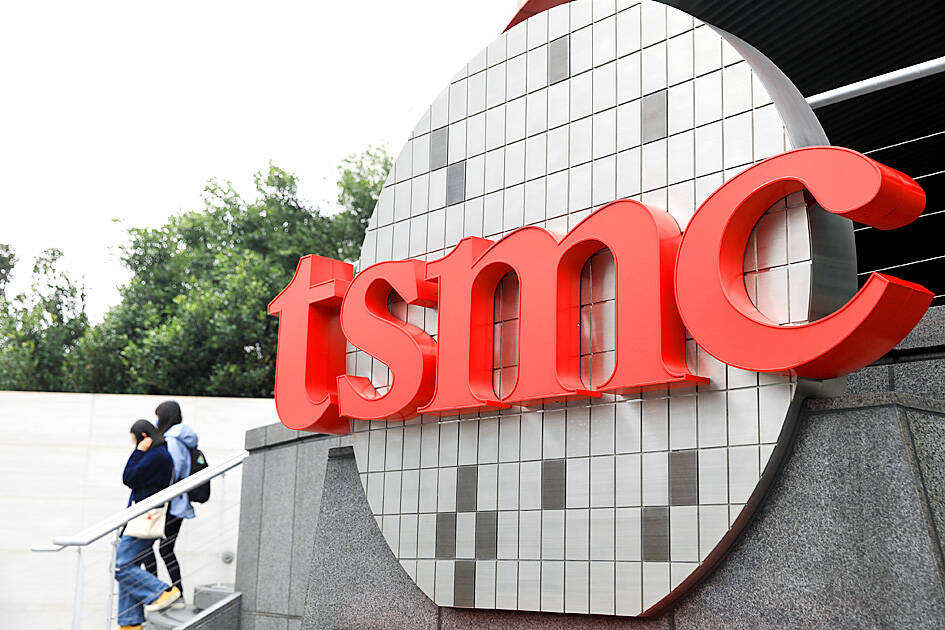Taiwan Semiconductor Manufacturing Co (TSMC, 台積電) shares rose 3.79 percent last week ahead of the company’s earnings conference on Thursday, outperforming the broader market’s 2.07 percent increase.
Yuanta Securities Investment Consulting Co (元大投顧) has retained its “buy” rating on the stock, with a 12-month target price of NT$584, expecting TSMC to maintain its tech leadership in the semiconductor industry.
The target price represents a 33.33 percent upside from the stock’s closing price of NT$438 on Friday in Taipei trading.

Photo: I-Hwa Cheng, Bloomberg
“Although TSMC is not immune to inventory adjustments in the short term, we are still optimistic about its leadership position and expect the advanced process technologies to boost its medium and long-term operational momentum,” Yuanta said in a client note on Friday.
“TSMC’s outlook is still good with stable profit prospects compared to second-tier foundries,” it said, adding that any significant correction in the near term would represent an opportunity to accumulate the stock for the long term.
TSMC on Friday reported third-quarter revenue of NT$613.14 billion (US$19.36 billion), up 14.79 percent from the previous quarter and an increase of 47.85 percent from a year earlier.
The contract chipmaker’s record quarterly revenue came as major customer Advanced Micro Devices Inc (AMD) on Thursday said that third-quarter sales would miss a prior forecast amid weaker-than-expected demand for PCs. In August, Nvidia Corp, another major customer, predicted that sales would fall short of its expectations for the latest quarter, largely due to weakness in the gaming market.
TSMC is scheduled to report its third-quarter earnings result on Thursday, and the market’s focus is to be on the chipmaker’s capacity utilization, the progress in its advanced process technologies and plans for price hikes, Yuanta said.
Additionally, investors are expected to observe whether TSMC retains its revenue growth forecast of an annual compound rate of 15 to 20 percent over the next few years, while also paying attention to the chipmaker’s capital spending estimate for next year and when its customers’ inventory adjustments might end, the note said.
“We expect the inventory adjustments triggered by the declining end-market consumer demand to impact TSMC’s sales from the fourth quarter this year to May next year,” Yuanta said.
Sales would resume growth from the third quarter next year, driven by the 5G, artificial intelligence and high-performance computing trends, with a significant contribution from 3-nanometer process technology, it said.
Many IC design companies have reportedly received TSMC’s notices of price hikes. If true, the benefits of price increases would gradually emerge from January next year to help boost TSMC’s average selling prices by about 3 percent, contributing to 9.1 percent sales growth annually next year, Yuanta said.
TSMC’s capital spending for next year is forecast to fall by 5 to 10 percent in US to between US$36 billion and US$38 billion, Yuanta said, citing the long lead times for equipment delivery and inventory adjustment risk.

In Italy’s storied gold-making hubs, jewelers are reworking their designs to trim gold content as they race to blunt the effect of record prices and appeal to shoppers watching their budgets. Gold prices hit a record high on Thursday, surging near US$5,600 an ounce, more than double a year ago as geopolitical concerns and jitters over trade pushed investors toward the safe-haven asset. The rally is putting undue pressure on small artisans as they face mounting demands from customers, including international brands, to produce cheaper items, from signature pieces to wedding rings, according to interviews with four independent jewelers in Italy’s main

Macronix International Co (旺宏), the world’s biggest NOR flash memory supplier, yesterday said it would spend NT$22 billion (US$699.1 million) on capacity expansion this year to increase its production of mid-to-low-density memory chips as the world’s major memorychip suppliers are phasing out the market. The company said its planned capital expenditures are about 11 times higher than the NT$1.8 billion it spent on new facilities and equipment last year. A majority of this year’s outlay would be allocated to step up capacity of multi-level cell (MLC) NAND flash memory chips, which are used in embedded multimedia cards (eMMC), a managed

Japanese Prime Minister Sanae Takaichi has talked up the benefits of a weaker yen in a campaign speech, adopting a tone at odds with her finance ministry, which has refused to rule out any options to counter excessive foreign exchange volatility. Takaichi later softened her stance, saying she did not have a preference for the yen’s direction. “People say the weak yen is bad right now, but for export industries, it’s a major opportunity,” Takaichi said on Saturday at a rally for Liberal Democratic Party candidate Daishiro Yamagiwa in Kanagawa Prefecture ahead of a snap election on Sunday. “Whether it’s selling food or

In the wake of strong global demand for AI applications, Taiwan’s export-oriented economy accelerated with the composite index of economic indicators flashing the first “red” light in December for one year, indicating the economy is in booming mode, the National Development Council (NDC) said yesterday. Moreover, the index of leading indicators, which gauges the potential state of the economy over the next six months, also moved higher in December amid growing optimism over the outlook, the NDC said. In December, the index of economic indicators rose one point from a month earlier to 38, at the lower end of the “red” light.